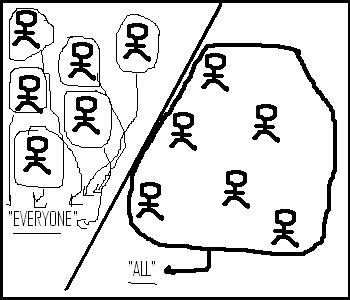Hi everyone, welcome to my very first writing workshop here at theOtaku. It's my hope that this sets a sort of prototype-model for any future things we write here. These all begin with what I shall now call "The Mike Ireland Big Three". Mr. Ireland was my high school English teacher way back in '95 and '96, and he was big on teaching us proper grammar. Anyway, these are my three most favourite grammar bits from the weird "very few people actually care about these" things I learned those two or three years.
This is the first.
Telling Everyone about Everyone:
Which of these sounds more correct:
Everyone is going to war.
or,
Everyone are going to war.
If you picked the first one, you'd be right. That feels like such a no brainer, doesn't it? Now consider this; which of the following seems correct:
Everyone should clean the blood off their swords.
or,
Everyone should clean the blood off his sword.
So now we come to the kicker... in the sword-cleaning example above, the second sentence is the grammatically correct one. The word "everyone" (or "everybody" or a phrase like "every drop of blood" for that matter) is singular. Makes sense considering how "everyone is" is the correct way to word that very first example, right? And yet that second example just feels wrong, perhaps? Let's look into it a little more...
The Illustrated Explanation:
"Everyone" is a bothersome word in that it describes a more-than-one concept but does it in a grammatically singular form. If you break up the compound word you get "every one"; as such, the word more or less says "every single individual being". All I can say is that the easiest way for me to truly grasp the concept of the word was when Mr. Ireland (my high school English teacher) drew this diagram on the blackboard:

(It did look better when he did it, of course)
So again, consider the following examples of "everyone" integrated in very natural-sounding lines:
"Everyone was out to get me." contrasted with "The police were out to get me."
"I am going to shoot everyone that isn't wearing a hat!" and "I am going to shoot the cosplayers that aren't wearing hats!"
Grammar is Sexist!
So let's go back to that first weird example I used at the start of this whole thing:
Everyone should clean the blood off his sword.
So now I'm hoping that everyone is (see what I did there?) accepting that the above statement is grammatically correct, if nothing else. In using a masculine pronoun to describe "everyone", it feels kinda wrong or politically incorrect in our 21st century mindset, doesn't it? Certainly in the olden days no one say a problem with using "he" and "him" for these kinds of things all the time; and hey, with bloody swords, maybe it's safe to assume that all parties involved are men? Obviously this isn't going to work with all sentences:
"Everyone is at home playing his Wii."
I probably just pissed off half of the Wii-owning population out there, huh?
So how do we make these suckers a little more gender-neutral without resorting to the (incorrectly-plural) "their" pronoun? Well, if you really need to you could always just go "his or her" in the sentence instead. It's grammatically correct, it covers all genders (third genders notwithstanding)... and depending on whom you ask, it's also kinda ugly and can get unwieldy if it's a long sentence.
Now if you have no beef with using just the one-gender pronoun in your writing either way, all the more power to ya. If you're cool with that, then cool. If you're not... then here's what I believe to be the best solution to the "everyone" pronoun problem:
Don't use it if you can help it.
Instead of using the singular-form "everyone", why not just switch it with a plural-form word like "all" or "people"? By doing that, you open up the allowance for that good ol' gender-neutral "their" pronoun.
"All of us are going to war."
"People should clean the blood off their swords."
"They are all at home playing their Wiis."
For Whom This Is Important:
If you do a lot of formal essay writing: No doubt you'll want to keep this bit in mind for when you write your stuff. The nature of the writing requires a whole lot of extra care with your wordings and your sentence structures, and having pronoun conflicts would not be good.
If you write stories/fanfiction: It's another one of those judgement calls you have to make since this "everyone/everybody" thing is such a common mistake that a lot of people don't even realise they're making. Is it more natural to have the characters say this wrong? Do you just chalk this up to an error made by a character and not you personally? Maybe have the "smarter" characters do this right and the "not-so-much" ones do it wrong? Just be aware of this as you write, and let your own personal convictions (about grammar, no less) finish the rest.
Regardless of what you're writing, though, it's good to know these things. I hope everyone here keeps this bit of useful information fresh in his or her mind... and makes sure to spread the info out to others so that they may better their writing in turn.